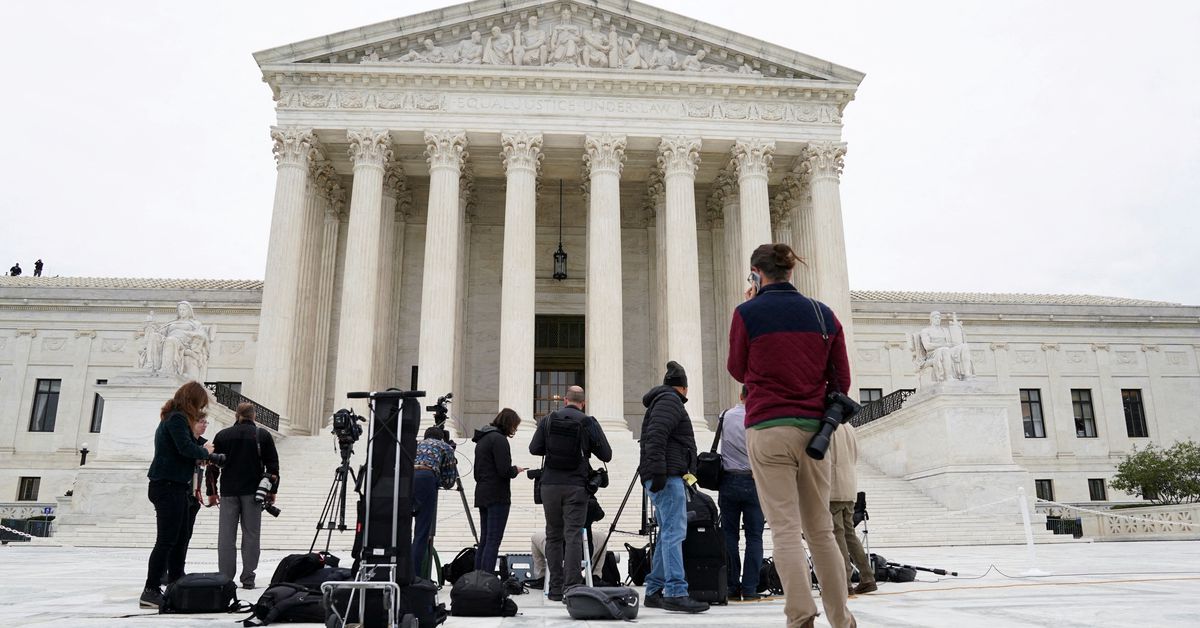Completely insane ruling. Wild that Kagan went across the aisle for this.
the First Amendment requires proofs of mental state
So I guess it’s basically impossible to convict anyone of anything involving speech? If I yell “fire” in a crowded theater, how can you prove I wasn’t having a delusion that there was a fire? Maybe there was an explosion in the movie and I was so immersed I thought it was real!
Dude had previous convictions and spent years doing this harassing, it’s not like this was an isolated mental break. Truly insane.
Yeah, the fact that he sent messages over multiple years, opened various accounts after the artist blocked him, and was actively messaging her about seeing her in public is pretty cut-and-dry stalking. Death threats are damning as well. Sure, he might not be mentally stable, but that shouldn’t give him a pass for reprehensible and dangerous behavior.
To be clear, I do not agree with the ruling, but the ruling was on whether this was a federal or a civil matter. I think the government should strongly prevent clear harassment and reasonable threats of violence, but the supreme court decided that threats or words are not enough in this case. I think it’s particularly two-faced, especially in light of threats of violence being used regularly to prosecute minorities and identify potential terrorists, but threats of violence directed towards a single person in the context of years of harassing behavior and a known pattern of behavior were apparently not enough.
If I had to guess, the court was wary of allowing any potential attacks to the 1st amendment, as they have been want to do in the past - a famous example of this in (somewhat) recent history is when the supreme court held that the 1st amendment was more important than the stolen valor act passed just a few years earlier. The ruling doesn’t particularly surprise me, nor does Kagan swapping sides because in the US we have a strong free speech identity and free speech limitations in terms of harassment has almost never been ruled on (one might make the argument that virginia v. black might be one such case, but that’s a case of racially motivated hate speech which is not quite analogous here).
Seems like the actual issue was that the law in question would let him be convicted even if he wasn’t doing these things and just being a nuisance. It’s not that he’s innocent, it’s that the law used is itself illegal.
I am struggling to figure out how anyone could be convicted of stalking under this ruling. Some of his texts even involves death threats!
I would say that he did demonstrate that he was insane, and therefore should be confined to a mental health institution.
But that’s the thing. Are they going to…put him in a mental institution? Because he desperately needs to be in a good one. I would be much more ok with this ruling if he were. I’m getting the sense he’s going back to society where he will behave totally normally from now on.
I sincerely doubt they would just release him to the general population.
This guy, given his behavior, should absolutely be in a facility where he can’t do any harm.
However - I have known a few people with Tourette’s over the years, and can absolutely say that mental state and abilities should play a factor in whether or not something that’s done would violate the law.
Yelling “fire” in a crowded theater may not be something someone with tourette’s can control. If that causes a stampede and people get trampled, that’s not their fault, in my opinion.
The point I’m making is that the “fire” is a classic example of speech that isn’t protected in the US, but with this ruling there’s no way to prove intent. So what if I sat down and continued watching the movie afterwards? I just got over the delusion. And someone with tourette’s would probably apologize, try to calm people down, or even avoid a theater altogether. I’m pretty sure that someone with a peanut allergy can’t sue a peanut farm if they go visit and sample the produce; if you know there’s an extra danger for you specifically in performing an activity then you are responsible.
Not to mention tourette’s could never cause targeted, violent, electronic-message based harassment either. This is a focused, intentional action.
In this particular case, I believe the accused should be an inpatient at a mental health facility, especially because of the violent threats that were made. There is no way he should be allowed to walk free and continue doing this to people.
In the case of someone with Tourette’s yelling “Fire! Titties! Fire!” in a crowded theater and causing a stampede - they are still not responsible, nor would they be ruled responsible for any deaths that occur, and that’s 100% correct in my view.
I don’t how it will affect your overall stance, but the “Yelling fire in a crowded theater” (aka, “clear and present danger”) test, which comes from Schenck v. United States, was overturned in 1979 with the case Brandenburg v. Ohio, which gave us the “Imminent Lawless Action” test, instead. This test requires:
- intent to speak, and
- imminence of lawlessness, and
- likelihood of lawlessness
Yelling fire in a crowded theater is only illegal if it meets that test-- all three requirements-- on a case by case basis.
In that instance, I would say that they probably should have known the potential risks involved with putting themself in that situation.
So you’re saying that people with disabilities should be excluded from society?
Pretty sure tourettes doesn’t make you create four new Facebook accounts
Maybe you overlooked where I said that this guy should be in a facility where he can’t hurt anyone?
deleted by creator
Seems like the ruling was correct. Colorado’s law seems too easy to convict.
Lawyers for the state responded that it was enough to look at the words in question, how they were conveyed and the response they elicited. The speaker’s subjective intent, they said, does not matter.
Threats have to have intent. I agree this case the defendant was likely guilty of making threats. But the SCOTUS was overturning the case on the grounds of the Colorado law. Not judging the defendant specifically. At least that’s how the above poster’s excerpts from Kagan’s decision and the 2 dissents from Barrett and Thomas read.
So I’ll defend this ruling.
Quick background: First Amendment protects people from being prosecuted for their speech, but some types of speech are not protected, and can be punished by the government. One of those exceptions is “true threats.” The federal and state governments can punish people for making true threats.
What the Supreme Court ruled: In order to determine whether any particular speech/message is a “true threat,” the court has to determine whether the person making that speech at least “consciously disregarded a substantial risk that his communications would be viewed as threatening violence” (or intended to threaten violence). The Colorado courts failed to apply this test properly, and any conviction for threats needs to go through that test, so they’ll need to do it again.
What the Supreme Court did not rule: Whether the communications in this case would pass or fail that test.
On that record, I think it’ll be pretty easy to convict under the new test.
After all, states punish people for theft, murder, robbery, assault, etc., when all of those convictions require proof that the defendant intended to cause that harm. Same with reckless driving and stuff like that: prosecutors know how to prove defendants’ states of mind, and do it all the time.
Among Counterman’s communications to Whalen were messages that read: “Was that you in the white Jeep?” and “You’re not being good for human relations. Die. Don’t need you.” Others used expletives.
Whalen said the messages eventually left her paralyzed with fear and anxiety, causing her to cancel shows and turn down career opportunities, and leading her to apply for a concealed handgun permit and sleep with a light on.
The Supreme Court marshal asks state officials to act on protests at justices’ homes
https://www.npr.org/2022/07/03/1109614708/protests-at-homes-of-supreme-court-justices
In a series of letters sent over the weekend, the marshal of the U.S. Supreme Court called on officials in Maryland and Virginia to “enforce” state and local laws that, she wrote, “prohibit picketing outside of the homes of Supreme Court Justices.”
“For weeks on end, large groups of protesters chanting slogans, using bullhorns, and banging drums have picketed Justices’ homes in Virginia,” Marshal Gail Curley wrote to Virginia Gov. Glenn Youngkin. “This is exactly the kind of conduct that Virginia law prohibits.”
Curley sent similar letters to Maryland Gov. Larry Hogan, along with several Maryland and Virginia county officials.
Curley’s requests come after weeks of protests and picketing outside the homes of the court’s conservative justices in the Maryland and Virginia suburbs of Washington, D.C. The protests began in May after a draft leaked of the justices’ eventual decision to overturn Roe v. Wade.
Justice Amy Coney Barrett, in a dissent to the ruling joined by fellow conservative Justice Clarence Thomas, wrote that the decision “unjustifiably grants true threats preferential treatment.”
…What the fuck? Am I taking crazy pills? In what fucking world do Thomas and Barrett advocate for a sane and rational approach to anything?
Turns out the Writer’s Guild strike affected the real world’s script too… the scabs currently working on the script of life are very confused about how things are supposed to go.
This one is going to require some poking around at other resources and summaries from legal minds greater than mine. I am baffled by the explanation laid out in this article.
This may be the most direct Catch-22 situation I’ve seen outside fiction novels, but with shitty stalkers. The stalker can’t be convicted unless he’s intending to threaten. He can’t be considered threatening if he doesn’t admit to being threatening. So as long as he says he didn’t mean to threaten, despite literally telling the victim to die, he can’t be convicted.
Kangaroo court, lmao.
If you read it, it becomes clear that the issue is that Colorado wrote a stalking law that is in conflict with the first amendment. Something that can easily be corrected going forward, if it hasn’t been corrected already.
So he was convicted in Colorado, but the proof for that conviction was not good enough for a federal court.
Among Counterman’s communications to Whalen were messages that read: “Was that you in the white Jeep?” and “You’re not being good for human relations. Die. Don’t need you.” Others used expletives. . . .
. . . . Whalen has described the messages from Counterman, which came to her over a two-year span beginning in 2014, as life-threatening and life-altering. She never responded to Counterman during this time and blocked his Facebook account at least four times, prompting him to continue messaging her from other platforms or through new Facebook accounts he created. . . .
“In a world rife with misunderstandings and miscommunications, people would be chilled from speaking altogether if they could be jailed for failing to predict how their words would be received. The First Amendment provides essential breathing room for public debate by requiring the government to demonstrate that the defendant acted intentionally or recklessly,” Hauss said.
Well, it’s good that we have safeguards for those who sit on their phone wrong and thereby unintentionally create block-evading accounts on multiple platforms. Guy really went to jail and it was all two solid years of misunderstandings. /s
I’m hearing harassment officially can’t be prosecuted, if we’re turning a blind eye to that degree. A lot of people are going to be emboldened by this, like they already took the law seriously anyway.
Like, yeah, a friend of mine nearly or actually got run off the road several times because the perpetrator wanted to date his gf, but maybe the would-be murderer was just a really bad driver. It was a notoriously dangerous road for both of them to be on ¯\_ (ツ) _/¯
The saddest part of this is I’m more shocked the CO police did something about it. Over here, they refused even a restraining order until we could show them a physical crime, which…you know, would kinda be too late.
Does this mean people are allowed to stalk supreme court “justices” now? It sounds like they are legalizing stalking.
If I understand right, this is a clarification (of sorts) to the standard of “true threat”. Ken White covers a lot of first amendment speech issues and has a very good explanation here: https://popehat.substack.com/p/supreme-court-clarifies-true-threats
So. To the practitioner, or to the internet tough-talker, what does this mean? It means that the law of the land, at least 7-2, is that a threat is only outside the protection of the First Amendment if:
- A reasonable person, familiar with the context, would interpret the threat as a sincere statement of intent to do harm, and
- The speaker was reckless about whether the threat would be taken sincerely — that is, they “consciously disregarded a substantial risk” that it would be taken seriously.
IANAL, but can read, and I think many people here are totally missing what this ruling actually says and doesn’t say. It says the standard that Colorado used in this man’s trial was too loose and would theoretically allow for conviction of protected speech. They did not say the speech in this case was definitely protected. They did not say it wasn’t threatening. It’s quite possible that if Colorado now chooses to retry the case that a jury would still decide he was guilty under the stricter standard too, but they have to retry him with a trial and jury working under that stricter standard, so that the overly loose law can’t be used to theoretically restrict protected speech under the first ammendment in the future. The supreme court just corrected the standard Colorado was using and kicked it back to them, they did not exonerate the guy unless Colorado chooses not to try him again. The headlines are all being written to be extra inflammatory and misleading.
Just to take it to an extreme and make it extra simple, let’s say we pass a law that says, you are guilty of murder if you are anywhere vaguely near where someone was killed. A guy is caught on video clearly murdering someone. They take him to court and tell the jury in their official jury instructions, if this man was vaguely near where the murder occurred he is guilty. They of course find him guilty. Supreme court steps in and says, wait, sure he’s probably guilty, but the standard you had the jury judging him by was ridiculous, that can’t be the standard for a murder conviction, and would probably result on infringement of multiple constitutional rights if you keep using that standard. Do a new trial with a better standard.
Holy shit. Supreme Court just declared open season on women.
No, they declared Colorado’s law is bad. This was a decision written by a liberal woman, joined by the other two liberal justices and four of the conservative ones. They do not have it out for women.
They essentially said that the messages he sent were covered under the first amendment. Have you read the messages he sent?
Among Counterman’s communications to Whalen were messages that read: “Was that you in the white Jeep?” and “You’re not being good for human relations. Die. Don’t need you.” Others used expletives.
Counterman, citing mental illness and delusions, argued that his messages were not intended to be threatening and were thus protected speech.
Not the guy you responded to but god damn… I can’t see that message being interpreted as anything BUT a threat. All I gotta do is declare insanity I guess.
Those were some of the most tame, to be honest.
Counterman told two of the women that “people in this position that I’m in right now have been [known] to have gone and killed people. Take nine millimeters and blow their heads off and shit like that. * * * I know where you’re all living.”13 He told another woman that he “ha[d] all your addresses and guess what? You ever heard of a letter bomber? Guess what I’ll be comin at ya with kerosene.”14
Also
In March 2011, a grand jury indicted Counterman for violating the federal criminal-threat statute again. 17 This time he was charged with leaving a woman a voicemail saying: “I’m coming back to New York by the way, OK? Maybe this month in March OK. I may be coming back his month or next month. I don’t know which. I’m looking forward to meeting up with you. I will rip your throat out on sight.”18
The man had also repeatedly made new accounts to continue messaging women after they blocked him. Multiple times.
Why are you shifting this argument so far? I never claimed the guy had tourette’s, and I never said this guy shouldn’t be insitutionalized. This is a completely irrelevant example.














